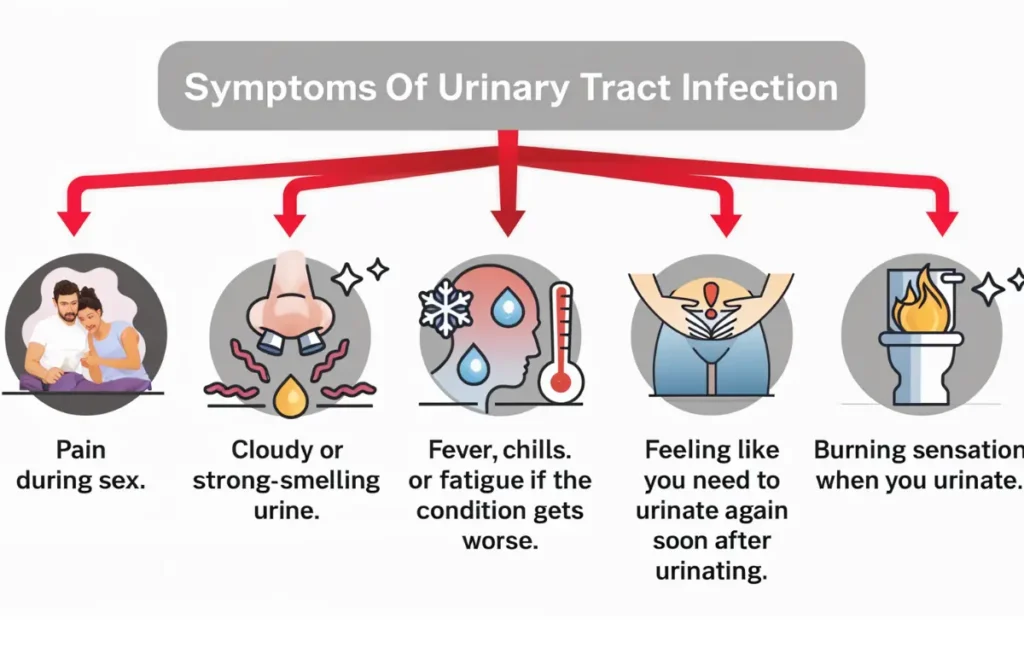Urinary tract infections (UTIs) are a common health issue that can significantly impact an individual’s quality of life. Affecting millions worldwide, these infections are often painful and can lead to severe complications if untreated. At Sunway Medical Center, we specialize in diagnosing and treating urinary tract infections (UTIs), offering patients advanced care to manage symptoms and prevent recurrence. This blog aims to provide an in-depth understanding of UTIs, including chronic urinary tract infection, cases where a UTI comes back right after antibiotics, and concerns about whether recurrent UTIs can be a sign of cancer.
What Is a Urinary Tract Infection (UTI)?
A urinary tract infection (UTI) occurs when harmful bacteria, fungi, or viruses invade the urinary system. Most UTIs are caused by Escherichia coli (E. coli), a bacterium found in the digestive system. The infection can affect any part of the urinary tract, which includes:
- Kidneys: Filter blood to produce urine.
- Ureters: Transport urine from the kidneys to the bladder.
- Bladder: Stores urine until it’s expelled.
- Urethra: Releases urine from the bladder to the outside of the body.
While urinary tract infections (UTIs) are often manageable, complications can arise if the infection spreads to the kidneys.

How Common Are Urinary Tract Infections (UTIs)?
Urinary tract infections (UTIs) are among the most prevalent bacterial infections globally. Statistics reveal that nearly 50% of women experience at least one UTI in their lifetime. Men, although less commonly affected, are not immune to these infections, particularly as they age or face other medical conditions.
Signs and Symptoms of Urinary Tract Infections (UTIs)
The symptoms of urinary tract infections (UTIs) can vary based on the severity and location of the infection. Common symptoms include:
- A strong, persistent urge to urinate.
- A burning sensation during urination.
- Passing small amounts of urine frequently.
- Cloudy or foul-smelling urine.
- Blood in the urine.
- Pelvic pain, particularly in women.
In cases of a chronic urinary tract infection, these symptoms may persist or recur despite treatment, requiring specialized care.
How Do You Get a Urinary Tract Infection?
Urinary tract infections (UTIs) develop when bacteria enter the urinary system and multiply. Common causes include:
- Poor Hygiene: Inadequate cleaning can allow bacteria to travel to the urinary tract.
- Sexual Activity: Sexual intercourse can introduce bacteria into the urinary tract.
- Medical Conditions: Diabetes and weakened immunity increase susceptibility.
- Catheters: Prolonged use of urinary catheters can lead to infections.
While anyone can develop a UTI, some individuals face a higher risk of recurring infections.
What Is a Chronic Urinary Tract Infection?
A chronic urinary tract infection is a UTI that persists or recurs frequently. Unlike acute infections, chronic UTIs can last for weeks or even months, requiring a more comprehensive treatment approach. Causes of chronic urinary tract infections include:
- Structural abnormalities in the urinary tract.
- Incomplete treatment of an initial infection.
- Kidney stones or blockages that trap bacteria.
- Weak immune responses.
Treating chronic urinary tract infections involves addressing these underlying factors to prevent future episodes.
What Are the Risks of Chronic Urinary Tract Infection?
Individuals with a chronic urinary tract infection may experience:
- Ongoing pain and discomfort in the lower abdomen.
- Fatigue due to repeated infections.
- Damage to the urinary tract or kidneys if untreated.
- Emotional distress from recurring symptoms.
Preventive care and targeted treatment are essential for managing chronic UTIs effectively.
UTI Comes Back Right After Antibiotics
It can be disheartening when a UTI comes back right after antibiotics, but this issue is not uncommon. Recurrence occurs for several reasons, including:
- Incomplete Eradication: The antibiotics may not have completely killed the bacteria.
- Antibiotic Resistance: Some bacteria are resistant to commonly prescribed medications.
- Reinfection: New bacteria can enter the urinary tract shortly after treatment.
When a UTI comes back right after antibiotics, it’s crucial to consult a healthcare provider to explore alternative treatments or preventive measures.
How to Manage Recurrent UTIs
Recurrent UTIs require a proactive approach to management, including:
- Identifying and treating underlying causes, such as anatomical issues or kidney stones.
- Long-term, low-dose antibiotics to prevent recurrence.
- Lifestyle modifications, such as increased water intake and improved hygiene practices.
At Sunway Medical Center, we provide personalized care plans to address recurrent UTIs and minimize their impact on patients’ lives.
Can Recurrent UTIs Be a Sign of Cancer?
One of the most concerning questions patients ask is, “Can recurrent UTIs be a sign of cancer?” While the vast majority of recurrent UTIs are benign, certain types of cancer, such as bladder or kidney cancer, can present with similar symptoms. Warning signs to watch for include:
- Blood in the urine that doesn’t resolve with treatment.
- Persistent pain in the back or abdomen.
- Weight loss or fatigue without a clear cause.
Although these signs are rare, they warrant immediate medical evaluation to rule out serious conditions. Sunway Medical Center offers advanced diagnostic tools to investigate and address such concerns.
Prevention of Urinary Tract Infections (UTIs)
Preventing urinary tract infections (UTIs) and chronic urinary tract infections involves adopting healthy habits, such as:
- Stay Hydrated: Drinking plenty of water helps flush out bacteria from the urinary system.
- Practice Good Hygiene: Clean from front to back after using the toilet to prevent bacteria transfer.
- Urinate After Sexual Activity: This helps eliminate bacteria that may have entered the urinary tract.
- Avoid Irritants: Limit the use of harsh soaps or feminine products that can disrupt the natural balance.
Simple lifestyle changes can significantly reduce the risk of UTIs, particularly for individuals prone to recurrent infections.
UTI Comes Back Right After Antibiotics: What to Do?
If a UTI comes back right after antibiotics, patients should consider:
- Requesting a urine culture to identify antibiotic-resistant bacteria.
- Switching to a different class of antibiotics.
- Exploring non-antibiotic preventive measures, such as probiotics or cranberry supplements.
These strategies can help break the cycle of recurring infections and improve quality of life.
Chronic Urinary Tract Infection: Long-Term Management
For individuals dealing with chronic urinary tract infection, long-term management includes:
- Regular follow-ups with a healthcare provider to monitor symptoms.
- Medications that target specific bacteria or underlying causes.
- Surgical interventions in rare cases of structural abnormalities.
Sunway Medical Center is equipped to handle complex cases of chronic urinary tract infections, providing patients with expert care and support.
Can Recurrent UTIs Be a Sign of Cancer? Understanding the Risks
Although rare, recurrent UTIs that don’t respond to treatment may indicate an underlying issue, such as bladder cancer. Patients with risk factors like smoking, a history of radiation therapy, or persistent hematuria should undergo thorough diagnostic testing. Early detection of cancer is critical for effective treatment.
Why Choose Sunway Medical Center for UTI Care?
At Sunway Medical Center, we offer:
- Comprehensive diagnostic services to identify the root cause of UTIs.
- Personalized treatment plans tailored to each patient’s needs.
- Advanced preventive care to reduce the risk of recurrent infections.
Whether you’re dealing with an acute UTI or a chronic urinary tract infection, our team is here to provide compassionate, expert care.
Conclusion
Urinary tract infections (UTIs) are a widespread but manageable condition. With the right treatment and preventive measures, patients can overcome even chronic urinary tract infections or cases where a UTI comes back right after antibiotics. If you’re worried about whether recurrent UTIs can be a sign of cancer, trust the specialists at Sunway Medical Center to provide clarity and effective care.




